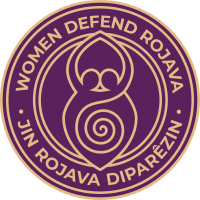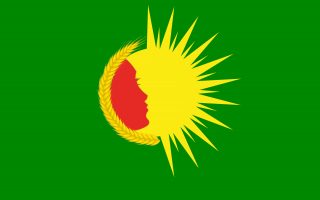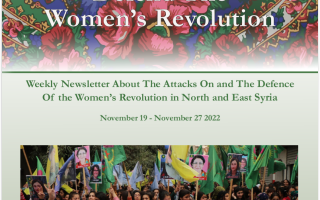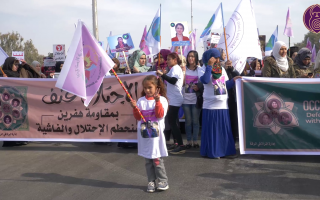This article from Andrea Wolf Institute of Jineolojî gives a perspective on the current corona virus crisis. Andrea Wolf Institute as part of the Jineolojî Academy in Rojava / North and East Syria is a place and space to create a connection point in a growing network of Jineolojî. Based on Jineolojî, a science for a free society based on women’s reality and knowledge, the aim is to deepen research on knowledge rooted in matriarchal values, revolutionary history as well as culture and resistance of women and different genders in different parts of the world. More information about Jineolojî on their webpage: https://jineoloji.org/en/
Perspective on corona virus crisis
We are facing the third world war. Here in the area of the Autonomous Administration of North and East Syria (also known as Rojava, West Kurdistan) it can really be felt. But this war is not only a military one. Its weapons are the destruction of the ecology, communal values and health. The third world war we are going through is making humanity sick in many different ways. Our search for our own truth is now more needed than ever. Abdullah Öcalan, who is at the front of the Kurdistan Liberation Movement says: “to find the truth we have to look back at where we lost it.”
To understand any disease we need to know what health is, what it means and how we can protect it. Etymologically, in old English the word ‘health’ comes from the word ‘whole’ or’ ‘wholeness’. What makes us whole is who we are. Before the implementation of patriarchy, state and capitalism, which developed together beginning around 5000 years ago, society was living in clans or big family groups where the mothers were the centres of life. Plants were the medicine used, based on the strengthening of body, mind and soul of the whole community. In the different parts of the world different health systems developed. All have very similar roots coming from the natural society (during Palaeolithic and Neolithic times). This is due to the fact that they were all created at a time where life was very close to and in harmony with nature. Later they developed according to regional and cultural differences. Until now, the mother, through carrying life, feeding and nurturing during the first years, is the first carer, and the bearer of knowledge of how life can be maintained and protected.
Health cannot be seen as an institution. Animals and living beings also have health care systems. Everything that exists in the universe tries to survive by maintaining a balance, by maintaining health, which has to be protected constantly through various self-defence systems, from the magnetic field of the earth to our antibodies.
Early medical traditions include those of Babylon, China, Egypt and India. The history of medicine shows how societies have changed in their approach to illness and disease from ancient times to the present, separating the woman from this primal central role of healer.
For example, the witch hunts, which became prominent particularly in central Europe after the Middle Ages from the VI to the XIX century (and still continue today in some parts of the world), was the attempt to break the role of women healers. Women who formed communities and carried out all sorts of work up until the end of the Middle Ages. The control of the State and Church over these women, who were also acting as midwives, dealing with pain, performing abortions and cures, was brutal. Millions were burnt alive, tortured and imprisoned but during more than 300 years the witch hunts imposed fear amongst the people, demonised women and took over her role of healer. She was replaced by the figure of the male doctor who focused only on the body, further dividing it into seperate systems.
It was an attempt to try and break the tight bond of women with nature. Something they didn’t manage to destroy, but which remains damaged until today. When in the 16th century the American continent was found by Europeans, they continued with witch hunts and massacred whole peoples because of their ancient practices and communal living, and in their search for power and domination. But the weapons of the colonisers which killed 90% of the indigenous populations in some areas, were not their guns, they were diseases they carried, like chickenpox, which the indigenous people had no defence against. Disease was their biggest threat and the result was a massacre, even though they couldn’t completely destroy the resistance which still continues.
In world epidemics women have always been on the front line. The Black Plague (1346-1353) was the worst pandemic recorded in human history, killing hundreds of millions of people. It was mostly women who were nursing and caring for the sick. The Plague killed more men, so women gathered together and continued to care for themselves and others. The Black plague came after a huge rise in population, destruction of forests, intense trade and disproportionate growth, not balanced with care for health or nature.
Nowadays, we can see some similar patterns in the corona crisis. Patriarchy and capitalism are in a deep crisis as communities, and nature are been destroyed, along with womanhood. The values which kept us alive, and those who transmitted it, like our elders and mothers are constantly attacked by modern society.
Globally, 70% of the health and social workforce are women. Also 90% of home workers, who care for the elderly for example, are women. Women are sustaining society because it is not just about being a doctor, its about caring, nursing, nurturing, feeding, educating and supporting. To achieve health we need ethics, emotions, empathy, sense of communality and connection with nature. Nowadays, the common approach to the corona crisis all around the world shows us how this has changed, and leads us to important questions: How do we understand life? What makes life possible?
If we look at Kurdistan, in Mesopotamia, in the Kurmanji language the word for life is ‘jiyan’ which has its root in the word for woman ‘jin’. Women are the givers and carers of life. But this concept of woman is not only a biological one, its a system of values and understanding which applies to all members of society. Life is not only a living body, life is all the creations from nature: raindrops, oceans, mountains, emotions, human society or falling leaves, and the organisation of them through biodiversity. The corona virus in itself is something alive because it reproduces and spreads, and also changes shapes, it mutates. So we need to understand it as part of life in the planet, and focus on the reasons behind it appearing and quickly expanding.
In modern society nature is seen as an object to exploit, and the human, represented by the white, rich dominant male, as the subject which is active in transforming the world to fit its needs. The land belongs to states and multinationals, and everything living on it becomes their property. The landscape is transformed. Where before there were wide spaces in which to live with the nature that we are a part of, we have erected buildings packed with walls to separate the people, even inside their own families. We had started a process of isolation which is clearly manifested today when we are forced to maintain it. But even forced into physical isolation we can still be connected in many ways and find the way to freedom inside our struggles. The example of Abdullah Öcalan inspires us. Even though he has been in isolation 21 years in the hands of the Turkish state, he continues fighting and his ideas go beyond walls and borders. Deep revolutionary connections can never be broken.
Right now the isolation to avoid people getting infected, as it’s applied, divides people and makes self-organisation difficult, weakening the already existing support networks. Families or solidarity networks cannot meet to find other ways to live this period, or to grieve their loved ones. Instead, the state, is now able to control people’s lives more than before by deciding who can and who can’t go outside, which types of work are necessary and which ones not, putting the value on capital and not on people. To be sure that everyone is following the new rules, the States are using the situation to increase repression, implementing curfews, filling up the streets with police and military, imposing fines or escalating surveillance. This is helping fear build up inside people’s hearts.
During the period of isolation socialization is carried out through technological means, and information is received through the internet and the mass media. Following the idea of the liberal individual freedom, there are no ethical or moral codes that control which messages are transmitted. Through the media liberal politics give way to fascism and the State is free to make a terror campaign in order to increase social control, making people more susceptible to accept their rights being stripped back, and promoting social division between those who are considered good citizens and bad citizens. The bad ones will be considered responsible for the spreading of the virus.
Socialisation is part of the human nature and thus health. The strength of our society is based on the love we have for each other and for who we are. This love will drive us to take care, and connects our existence in one human soul. The current situation of isolation is having a great impact on mental health as it generates feelings of impotence and loneliness, but this is a tip of an iceberg which began to freeze hundreds of years ago. We are all connected, and now we will keep connecting in whichever ways which fit the need to defend ourselves and prevent deaths.
We are seeing how in big cities, people are fighting for survival after losing their means of getting an income, revealing how linked our life is to the capitalist system and how survival is not anymore in our hands. Society is not run by society but by external means, states or products. Each territory is not capable of fulfilling the needs of its population on its own. Outside globalised capitalist logic, we can see for example on a local level in Kurdistan people working the land, planting, cultivating and making masks for their communities. Even living under the embargo of war, the society can adapt better to the new conditions because they are organised communally.
Regarding women, we see that all over the world the seclusion at home is becoming a prison for those who face gender-based violence. Women are exposed to violence and death in their own homes. They are staying in their nuclear families unable to take the public space which we fought so hard for. Women can only be free if the society is free, so staying strong together and preserving the ethics of society, will keep the struggle for freedom alive. We cannot leave anyone alone.
In the streets, in the prisons and along border crossings, violence has increased. Racist policies are being implemented, and rights are being restricted. Also, we are seeing how the imperialist States are acting in the name of life, asking people to stay at home whilst war planes and drones take to the skies. War goes on, occupying land, killing people and threatening life itself, as is happening here, with the Turkish state bombing civilians and cutting water and electric supplies to thousands of people who depend on them to live and to fight the virus.
We see that the real disease doesn’t come from corona virus but from the capitalist, colonial, patriarchal system which has made humanity sick in the first place. As Abdullah Öcalan wrote in his defence writings, “there are many indications that signal the end of the system as well as many true sagas that agree with this -but the real problem lies in deciding which free, equal, and democratic values should be communalized out of this chaos”. Coronavirus is just another one of these indications that shows us that a radical change of paradigm is needed.
We already have the seeds to build a new paradigm. Those who have resisted oppression until today still carry democratic values and ways of organizing collectively and with solidarity with each other. In the revolutionary movement of Kurdistan we find a proposal for a new paradigm. In this moment of worldwide disease we need to focus on how we defend life, its true ethics and freedom in a global and holistic way.
In the Kurdistan Liberation Movement self defence is synonym of existence. It is said that: “A being that cannot defend itself cannot exist”. Self defence is linked to society and identity. All living beings have a defence system. All existence is a constant struggle. If we look at the dandelion for example, wind can blow its seeds and the plant is left naked and appears to have died, but its seeds are spreading everywhere. The rose defends its life with spines which also act as a warning.
Self defence is a way of organising society. During the last two months we have seen how mechanisms of social self-defence have been activated all across the world, in the form of solidarity networks with the people most affected by isolation, distributing food and masks. People have united to fight against measures which destroy the social tissue which protects us. Workers have organised strikes, solidarity messages are sent from across the globe, hunger strikes are being carried out, as well as protests inside prisons to defend basic human rights.
Empty streets, which are giving way to non-human life, are also showing us the damaging effect that the capitalist system has on the environment. Air pollution in some places has decreased up to 40% since the beginning of the isolation. If we see the power of creating life from nature and we connect with it as part of it, we can overcome the liberal mindset, the false needs imposed, the supremacy of human beings over the animals, or the supremacy of men over women.
Facing every crisis, an option for revolutionary change emerges, a change that brings a solution for all the societies in the world. The word crisis comes from Greek krisis, which means ‘decision’. When we reach this moment, we need to make a decision to overcome a turning point. We can see the end of capitalism, imperialism and patriarchy closer than ever because its truth is coming into light. At this time there is as much anguish and despair about the exceptional situation as there is hope and the real possibility of change. Believing in this increases the chances of making the world revolution a reality, and it is necessary to remember here and now that this is the century of women, and that perhaps the coronavirus is the precise blow, the one that will allow us to see this moment of chaos as an opportunity for the World Revolution. A new possibility can arise from our common pain and our collective hope.
Andrea Wolf Institute of Jineolojî
This short video also shows us how “We are together in this, in solidarity with those who lost their lives and all the people who are fighting, everyday, everywhere” and the connection of our struggles in past and present.




